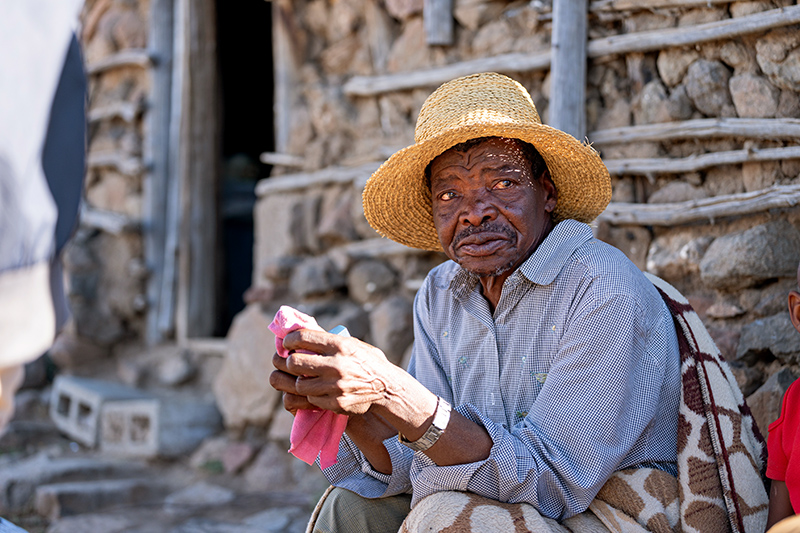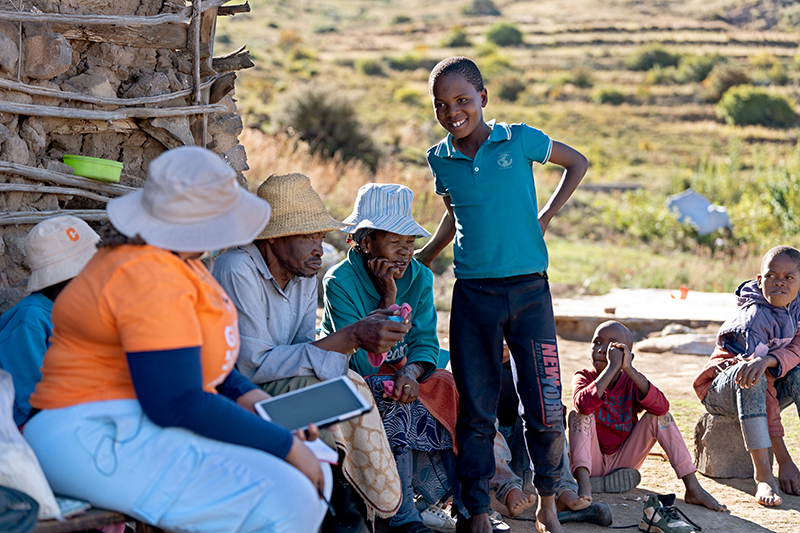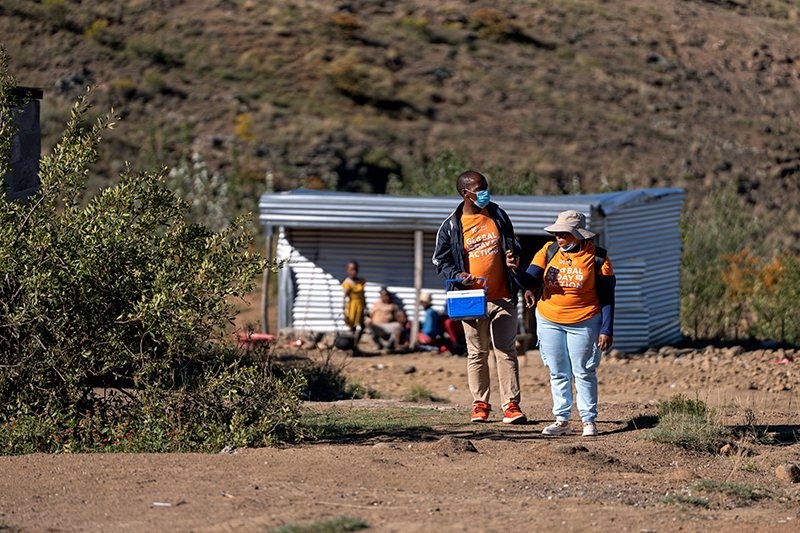Tuberculosis Contact Tracing: A Lifeline for Families in Lesotho
Protecting vulnerable lives in overcrowded homes
Posted on Feb 14, 2025

In the remote villages of Lesotho, where families often live in close quarters and health care access is limited, tuberculosis (TB) remains a persistent threat. Partners In Health (PIH) Lesotho is at the forefront of efforts to curb the spread of this deadly infectious disease through meticulous contact tracing, a strategy that is particularly vital in overcrowded households.
A Family's Struggle with Tuberculosis
In a small village nestled in the southern highlands of Lesotho, a modest one-room house is home to nine family members. Among them is 73-year-old Thobei Tlake, who has been battling TB for several months. Thobei shares this confined space with his wife, 78-year-old 'Mankopane Monyane, who has been his primary caregiver throughout his illness, and their seven grandchildren, who range in age from 6 to 13 years old.
The close quarters and the presence of a person with TB create a high-risk environment for everyone in the household. When ‘Maposholi Posholi, a dedicated TB screener with PIH Lesotho, arrived at the family’s home, she was acutely aware of the risks posed by such tight living conditions.
"TB spreads easily in environments where people are in constant close contact, especially in overcrowded spaces," Posholi explained as she prepared to conduct the necessary screenings to see if the infection had spread to other members of the household. "It’s crucial that we identify and treat TB as early as possible to protect these children and prevent further transmission."

The Crucial Role of Contact Tracing
TB contact tracing is a meticulous process that involves identifying and screening all individuals who have been in close contact with TB. In this case, Posholi’s task was particularly urgent. With seven children living in a single room with their ill grandfather, the risk of transmission was alarmingly high.
The dangers of such living arrangements are manyfold. TB is an airborne disease, spreading through tiny droplets released into the air when an infected person coughs, sneezes, or even speaks. In a cramped space, these droplets can linger in the air, significantly increasing the likelihood of transmission. For the children, whose immune systems are still developing, and their elderly grandmother, the risk was even greater.
"These children are our future, and we must do everything we can to protect them from this disease," Posholi said, her voice steady but filled with concern. She began the contact tracing process, carefully observing each child for signs of TB; and asking if any of them were experiencing persistent coughing, weight loss, night sweats, and fatigue. The process also included measuring the height and weight of each child to monitor their growth and overall health.
To ensure a thorough assessment, Posholi collected samples of sputum—a thick mucus made in the lungs and airways—from each grandchild and their grandmother. This sample collection is a vital step in TB diagnosis, as it allows for the detection of TB bacteria in the lab.
"Early detection is key," Posholi emphasized. "In many cases, TB can go undetected until it’s too late, especially in children. By conducting these tests, we can catch the disease early and begin treatment immediately."
Fortunately, in a week’s time, all the sputum tests came back negative, providing the family with some relief. However, given the close living conditions and the imminent risk of TB infection, Posholi took further precautions.
Mitigating the Risk: TB Prophylaxis
To mitigate the imminent risk of TB infection that the children and their grandmother were facing, Posholi recommended that they all take daily preventative medication, known as TB prophylaxis, for three months. The treatment helps to stop TB from developing in individuals who have been exposed to the bacteria but are not yet symptomatic, people with weakened immune systems, and others. This measure was essential in protecting the family from the potential onset of TB, particularly in such a vulnerable environment.

"Prophylaxis is a critical step in preventing the disease from taking hold," Posholi noted. "By taking this preventive measure, we can reduce the likelihood of the children and their grandmother developing active TB, ensuring that they remain healthy."
Overcrowding: A Breeding Ground for Tuberculosis
The visit to Thobei Tlake’s family home highlights a broader issue that is prevalent in many parts of Lesotho: overcrowding. In rural areas, it’s common for large families to live in small, single-room houses, with little ventilation and no space for isolation. These conditions create a perfect storm for the spread of TB, turning homes into breeding grounds for the disease.
"Overcrowded living conditions are one of the biggest challenges we face in the fight against TB," Posholi noted. "When multiple people share a single room, there’s no way to avoid exposure if someone has TB. This is why contact tracing and early intervention are so critical."
In households like this one, where space is limited, the lack of isolation can turn a single case of TB into a household outbreak. This is particularly dangerous in Lesotho, where TB rates are already among the highest in the world, and the HIV epidemic has only exacerbated the situation by increasing individuals' susceptibility to TB.
Partners In Health Lesotho: A Lifesaving Mission
The work of PIH Lesotho goes beyond just treating TB; it involves educating communities through door-to-door outreach, supporting patients, and implementing preventive measures that can stop the spread of the disease. Contact tracing is a cornerstone of this effort, allowing health care workers to identify potential cases early and intervene before the disease can take hold.

"Every visit and every test is a step toward a TB-free Lesotho," Posholi reflected as she prepared to leave the family’s home. "It’s a long journey, but with each household we visit, we’re making progress."
As PIH continues its work across Lesotho, the importance of TB contact tracing remains clear. In a country where the disease has touched thousands of lives, these efforts are not just about treating illness; they’re about safeguarding the future. Through diligent screening, timely intervention, and unwavering commitment, PIH Lesotho is bringing hope to families like Thobei’s, ensuring that they can look forward to a healthier, TB-free tomorrow.

